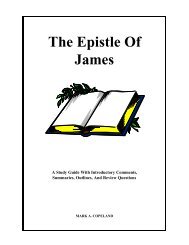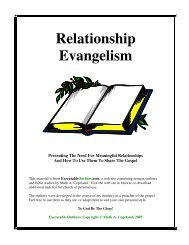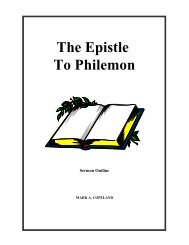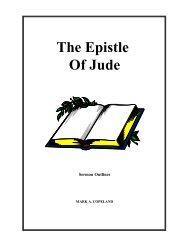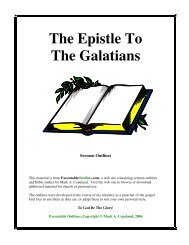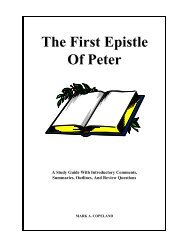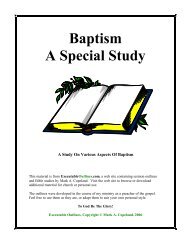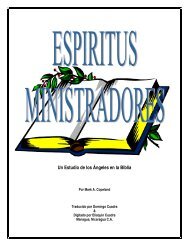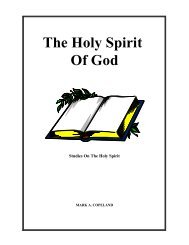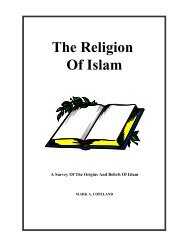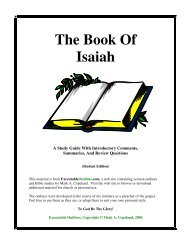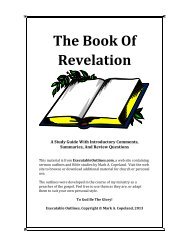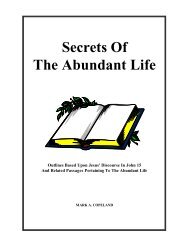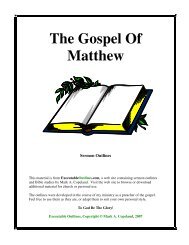- Page 1 and 2:
Topical Sermons Miscellaneous Sermo
- Page 3 and 4:
Mark A. Copeland Gospel Meetings -
- Page 5 and 6:
After Conversion, What Then? Mark A
- Page 7 and 8:
INTRODUCTION The Anatomy Of A Backs
- Page 9 and 10:
of this world have to offer! Mark A
- Page 11 and 12:
Mark A. Copeland [To encourage the
- Page 13 and 14: The Apostasy And Restoration Mark A
- Page 15 and 16: -- The end result was even more den
- Page 17 and 18: estore Christ's church and correct
- Page 19 and 20: Mark A. Copeland 3) The kingdom is
- Page 21 and 22: Mark A. Copeland 2. As we move fart
- Page 23 and 24: to us! Mark A. Copeland 2. Are ther
- Page 25 and 26: Mark A. Copeland A. WHERE IT CAN HE
- Page 27 and 28: Are You Ready For Your Journey Into
- Page 29 and 30: Mark A. Copeland 4. What is baptism
- Page 31 and 32: Mark A. Copeland C. THE QUALIFICATI
- Page 33 and 34: Mark A. Copeland Attitudes Needed I
- Page 35 and 36: Mark A. Copeland F. HOSPITALITY...
- Page 37 and 38: Back To The Basics! Mark A. Copelan
- Page 39 and 40: . chara (joy), then, is the respons
- Page 41 and 42: The Benefits Of A Small Church Mark
- Page 43 and 44: CONCLUSION Mark A. Copeland 1. Agai
- Page 45 and 46: Mark A. Copeland a. We slaughter th
- Page 47 and 48: Blest Be The Tie Mark A. Copeland I
- Page 49 and 50: Mark A. Copeland B. “BUT WE SHALL
- Page 51 and 52: Mark A. Copeland in many other civi
- Page 53 and 54: Mark A. Copeland a. But again this
- Page 55 and 56: 3. Man, with his imperfections, is
- Page 57 and 58: Mark A. Copeland 1) Find the source
- Page 59 and 60: The Celebration Of Christmas Should
- Page 61 and 62: Mark A. Copeland 4) He participated
- Page 63: The Celebration Of Easter A Histori
- Page 67 and 68: Mark A. Copeland 2. My prayer is th
- Page 69 and 70: Mark A. Copeland B. WE MUST KEEP A
- Page 71 and 72: Church Membership Mark A. Copeland
- Page 73 and 74: The Clarion Voices Of God Mark A. C
- Page 75 and 76: c. Through His Son d. Through His P
- Page 77 and 78: Mark A. Copeland 2. One theory why
- Page 79 and 80: Mark A. Copeland A. WE CAN BE TAUGH
- Page 81 and 82: Mark A. Copeland 4. The members mus
- Page 83 and 84: -- Congregational singing reaches u
- Page 85 and 86: Mark A. Copeland II. EXPLANATIONS F
- Page 87 and 88: Cremation Or Burial? Mark A. Copela
- Page 89 and 90: Mark A. Copeland C. BURIAL REFLECTS
- Page 91 and 92: Mark A. Copeland 1. Jesus stressed
- Page 93 and 94: Daily Bible Reading - Part Two How
- Page 95 and 96: Mark A. Copeland a. Encourage other
- Page 97 and 98: Mark A. Copeland [It is the use of
- Page 99 and 100: -- We better have our “wells” d
- Page 101 and 102: INTRODUCTION Disappointments New Ch
- Page 103 and 104: B. WHEN NEGATIVE TEACHING IS CALLED
- Page 105 and 106: Mark A. Copeland C. THUS THE IMPORT
- Page 107 and 108: Emotion Vs. Emotionalism Mark A. Co
- Page 109 and 110: Mark A. Copeland C. WHEN EMOTION IS
- Page 111 and 112: Mark A. Copeland B. ADVANTAGES OF U
- Page 113 and 114: Evangelism Made Personal Mark A. Co
- Page 115 and 116:
Mark A. Copeland 1. Start with thos
- Page 117 and 118:
CONCLUSION Mark A. Copeland 1. Thes
- Page 119 and 120:
Mark A. Copeland [Whose example are
- Page 121 and 122:
Faith In The Community Mark A. Cope
- Page 123 and 124:
Faith In The Family Mark A. Copelan
- Page 125 and 126:
Mark A. Copeland [Finally, some rem
- Page 127 and 128:
1. From the epistles of Paul - Ep 6
- Page 129 and 130:
-- Weak Christians need to be assis
- Page 131 and 132:
Mark A. Copeland 2. Lack of commitm
- Page 133 and 134:
Mark A. Copeland And they will beco
- Page 135 and 136:
. Babes in Christ often require spe
- Page 137 and 138:
God Hates Divorce! Mark A. Copeland
- Page 139 and 140:
2. What can be done to stem the tid
- Page 141 and 142:
2. With submission, as the church i
- Page 143 and 144:
a. Making one wise regarding salvat
- Page 145 and 146:
The Gospel According To Isaiah Mark
- Page 147 and 148:
CONCLUSION b. A promised fully real
- Page 149 and 150:
depends upon God (more on prayer la
- Page 151 and 152:
Gospel Meetings Why Should We Atten
- Page 153 and 154:
Gospel Meetings Why Some Succeed An
- Page 155 and 156:
1. Shown by failing to welcome them
- Page 157 and 158:
Mark A. Copeland 2) Those who worke
- Page 159 and 160:
The Gospel Of Christ Mark A. Copela
- Page 161 and 162:
2. Our sins are “blotted out”,
- Page 163 and 164:
Mark A. Copeland [So don’t be sel
- Page 165 and 166:
Grace And The Christian Mark A. Cop
- Page 167 and 168:
CONCLUSION Mark A. Copeland 2) But
- Page 169 and 170:
II. THE MAKING OF A DISCIPLE Mark A
- Page 171 and 172:
-- For those willing to believe, et
- Page 173 and 174:
The Great Commission According To L
- Page 175 and 176:
The Greatest Need Mark A. Copeland
- Page 177 and 178:
1. Jesus commanded that disciples b
- Page 179 and 180:
Growing Old Gracefully Mark A. Cope
- Page 181 and 182:
Mark A. Copeland - cf. Lk 12:15 2.
- Page 183 and 184:
Mark A. Copeland 4. Such a person w
- Page 185 and 186:
Mark A. Copeland II. THE REWARDS OF
- Page 187 and 188:
1. It cost Him the sacrifice of His
- Page 189 and 190:
How Much Should I Give? Mark A. Cop
- Page 191 and 192:
Mark A. Copeland [These principles
- Page 193 and 194:
How Well Do You Listen? Mark A. Cop
- Page 195 and 196:
Mark A. Copeland the gospel of Chri
- Page 197 and 198:
I Am Coming, Lord! Mark A. Copeland
- Page 199 and 200:
Into All The World Using Bible Corr
- Page 201 and 202:
-- The true measure should be, “H
- Page 203 and 204:
Is Your Baptism Scriptural? Mark A.
- Page 205 and 206:
-- The Biblical subject for baptism
- Page 207 and 208:
Jesus, My Lord Mark A. Copeland INT
- Page 209 and 210:
2) Nor wallowing in past failures d
- Page 211 and 212:
1. His sheep hear His voice - Jn 10
- Page 213 and 214:
Mark A. Copeland II. IN THE NEW TES
- Page 215 and 216:
Laying Up Treasure In Heaven Mark A
- Page 217 and 218:
Mark A. Copeland b. To a rich ruler
- Page 219 and 220:
Mark A. Copeland II. LET’S MAKE A
- Page 221 and 222:
The Lord’s Supper Mark A. Copelan
- Page 223 and 224:
2. For this reason I personally que
- Page 225 and 226:
The Lostness Of The Lost Mark A. Co
- Page 227 and 228:
Making Wise Choices Mark A. Copelan
- Page 229 and 230:
Mark A. Copeland [There will be tim
- Page 231 and 232:
Mark A. Copeland [Because of these
- Page 233 and 234:
INTRODUCTION The Measure Of A Stron
- Page 235 and 236:
a. Where things are done as He dire
- Page 237 and 238:
Mark A. Copeland [It should be evid
- Page 239 and 240:
Mark A. Copeland Music In New Testa
- Page 241 and 242:
Mark A. Copeland quite common in th
- Page 243 and 244:
The Need For Vision Mark A. Copelan
- Page 245 and 246:
2. Faith in the power of the Lord a
- Page 247 and 248:
. We are to set our minds on thing
- Page 249 and 250:
INTRODUCTION The Old Testament And
- Page 251 and 252:
“that the man of God may be compl
- Page 253 and 254:
INTRODUCTION The Parable Of The Lif
- Page 255 and 256:
Mark A. Copeland b. Not that physic
- Page 257 and 258:
B. JESUS THEREBY DEMONSTRATED WHAT
- Page 259 and 260:
The Path To Salvation Mark A. Copel
- Page 261 and 262:
-- Have you made Jesus your Teacher
- Page 263 and 264:
Mark A. Copeland 3. Two others had
- Page 265 and 266:
Mark A. Copeland Peter (Acts 10) d.
- Page 267 and 268:
Mark A. Copeland actors c. In The P
- Page 269 and 270:
Mark A. Copeland b. But Re 3:20 is
- Page 271 and 272:
The Perverted Gospel Its Witness Ma
- Page 273 and 274:
. Faith based on their testimony is
- Page 275 and 276:
2. As foreseen by Isaiah, many woul
- Page 277 and 278:
1. We have been created to walk in
- Page 279 and 280:
Principles Of Church Growth Mark A.
- Page 281 and 282:
d. Bear with the infirmities of the
- Page 283 and 284:
1. The time may vary for different
- Page 285 and 286:
Mark A. Copeland a. The more we lea
- Page 287 and 288:
INTRODUCTION The Problem Of Religio
- Page 289 and 290:
Mark A. Copeland C. RESTRAIN PERSON
- Page 291 and 292:
Mark A. Copeland 1. There is a more
- Page 293 and 294:
A Reason For Our Hope Mark A. Copel
- Page 295 and 296:
Mark A. Copeland evidence for our N
- Page 297 and 298:
Reflections On The Loss Of A Loved
- Page 299 and 300:
-- Do you sing spiritual songs enou
- Page 301 and 302:
C. ATTEND ALL THE SERVICES OF THE C
- Page 303 and 304:
Mark A. Copeland b. To demonstrate
- Page 305 and 306:
Responding To Materialism Mark A. C
- Page 307 and 308:
2. What does Jesus offer...? a. Res
- Page 309 and 310:
Mark A. Copeland d. “these words
- Page 311 and 312:
Mark A. Copeland and Jesus Christ o
- Page 313 and 314:
Same-Sex Marriage Mark A. Copeland
- Page 315 and 316:
Mark A. Copeland 1. Same-sex marria
- Page 317 and 318:
Mark A. Copeland B. ABIDING IN CHRI
- Page 319 and 320:
Mark A. Copeland 1. In Jn 15:11, we
- Page 321 and 322:
Mark A. Copeland [Having defined th
- Page 323 and 324:
Mark A. Copeland couples in the mod
- Page 325 and 326:
II. AS PROMISED Mark A. Copeland A.
- Page 327 and 328:
Mark A. Copeland Him - Ac 10:39-41
- Page 329 and 330:
The Single Christian Mark A. Copela
- Page 331 and 332:
Mark A. Copeland 1. No matter what
- Page 333 and 334:
1. Implied in Pro 14:34 a. A righte
- Page 335 and 336:
Spirituality In Youth Is It Possibl
- Page 337 and 338:
Studying With JWs Mark A. Copeland
- Page 339 and 340:
Mark A. Copeland III. SUGGESTIONS F
- Page 341 and 342:
Mark A. Copeland c. By claiming tha
- Page 343 and 344:
Support Your Local Church! Mark A.
- Page 345 and 346:
Mark A. Copeland 2) God wants to gi
- Page 347 and 348:
Mark A. Copeland 1) “Speak oft wi
- Page 349 and 350:
To Seek Or To Serve? Mark A. Copela
- Page 351 and 352:
Mark A. Copeland CONCLUSION 1. Rega
- Page 353 and 354:
Mark A. Copeland 3. We are to worsh
- Page 355 and 356:
5. During different moods a. Some w
- Page 357 and 358:
Mark A. Copeland 2. The Hebrews are
- Page 359 and 360:
The Value Of Secret Prayer Mark A.
- Page 361 and 362:
Mark A. Copeland [Since the God who
- Page 363 and 364:
Mark A. Copeland throw away your ti
- Page 365 and 366:
We Should Remember The Poor Mark A.
- Page 367 and 368:
1. Paul, in several of his epistles
- Page 369 and 370:
Mark A. Copeland B. TWO THINGS ARE
- Page 371 and 372:
What God Has Joined Mark A. Copelan
- Page 373 and 374:
. They will not inherit the kingdom
- Page 375 and 376:
Mark A. Copeland C. BY ALL CHRISTIA
- Page 377 and 378:
Mark A. Copeland A. EXPLANATION OF
- Page 379 and 380:
Mark A. Copeland 1) Whether we are
- Page 381 and 382:
Mark A. Copeland I strive to serve
- Page 383 and 384:
Mark A. Copeland II. PARTICIPATION
- Page 385 and 386:
Mark A. Copeland A. THIS IS CLEARLY
- Page 387 and 388:
“...blameless and harmless, child
- Page 389 and 390:
Mark A. Copeland c. Meeting the nee
- Page 391 and 392:
INTRODUCTION What Visitors Have A R
- Page 393 and 394:
a. Is their impression one of activ
- Page 395 and 396:
When The Election Is Over Mark A. C
- Page 397 and 398:
-- Our King and Lord is truly the o
- Page 399 and 400:
. That the Jews and Romans did not
- Page 401 and 402:
Mark A. Copeland B. HOW MUCH DOES O
- Page 403 and 404:
Mark A. Copeland 1. There may be ot
- Page 405 and 406:
Mark A. Copeland 1. Jesus commands
- Page 407 and 408:
Mark A. Copeland A. A GOOD CONSCIEN
- Page 409 and 410:
c. Being united with Christ in His
- Page 411 and 412:
Mark A. Copeland 3. Before Caiaphas
- Page 413 and 414:
. To be our perfect High Priest c.
- Page 415 and 416:
Mark A. Copeland [Any work that a w
- Page 417 and 418:
Would We Have Believed Them? Mark A
- Page 419 and 420:
Mark A. Copeland a. It may be specu
- Page 421:
A. HE SAID, “BAPTIZING THEM...”



